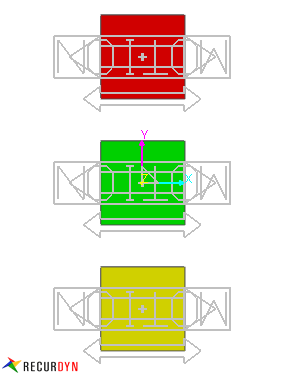4.8.2.7. MOTION
This subroutine defines a user - defined motion. This subroutine can be used for translational joint, rotational joint, cylindrical joint and PTCV.
Language type |
Subroutine |
FORTRAN |
motion_usub (TIME,UPAR,NPAR,IORD,IFLAG,RESULT) |
C/C++ |
motion_usub (double time, double upar[], int npar, int iord, int iflag, double *result) |
Variable Name |
Size |
Description |
time |
double |
Current simulation time of RecurDyn/Solver. |
upar |
double[30] |
Parameters defined by the user. The maximum size of array is 30. |
npar |
int |
Number of user parameters. |
iord |
int |
Integrator order. |
iflag |
int |
When RecurDyn/Solver makes its initial call to this routine, the flag is true. Otherwise, the flag is false. |
result |
double |
Returned value and one-dimensional variable. |
Example

Figure 4.111 Example Model using Motion User Subroutine
Note
If the user wants to run this model using a user subroutine, the user can refer it in the directory (<install dir>\Help\usub\**).
Motion User Subroutine can only be used as displacement.
C---- SUB. MOTION_USUB
SUBROUTINE MOTION_USUB
& (TIME,UPAR,NPAR,IORD,IFLAG,RESULT)
C---- TO EXPORT * SUBROUTINE
!DEC$ ATTRIBUTES DLLEXPORT,C::MOTION_USUB
C---- INCLUDE SYSTEM CALL
INCLUDE 'SYSCAL.F'
C---- DEFINE VARIABLES
C Parameter Information
C TIME : Simulation time of RD/Solver. (Input)
C UPAR : Parameters defined by user. (Input)
C NPAR : Number of user parameters. (Input)
C IORD : Integrator order. (Input)
C IFLAG : When RD/Solver initializes arrays, the flag is true. (Input)
C RESULT : Returned value. (Output)
DOUBLE PRECISION TIME, UPAR(*)
INTEGER NPAR, IORD
LOGICAL IFLAG
DOUBLE PRECISION RESULT[REFERENCE]
C---- USER STATEMENT
DOUBLE PRECISION SHIFT, OMEGA
DOUBLE PRECISION VALUE
DOUBLE PRECISION COEF(3)
LOGICAL ERRFLG
SHIFT = UPAR(1)
OMEGA = UPAR(2)
COEF(1) = UPAR(3)
COEF(2) = UPAR(4)
COEF(3) = UPAR(5)
CALL RD_FORCOS(TIME, SHIFT, OMEGA, COEF, 3, IORD, VALUE, ERRFLG)
RESULT = VALUE
RETURN
END
#include "stdafx.h"
#include "DllFunc.h"
Motion_API void __cdecl motion_usub
(double time, double upar[], int npar, int iord, int iflag, double* result)
{
using namespace rd_syscall;
// Parameter Information
// time : Simulation time of RD/Solver. (Input)
// upar : Parameters defined by user. (Input)
// npar : Number of user parameters. (Input)
// iord : Integrator order. (Input)
// iflag : When RD/Solver initializes arrays, the flag is true. (Input)
// result : Returned value. (Output)
// User Statement
// Local Variable Definition
double shift, omega;
double value;
double coef[3];
int errflg;
// Assign Impact Parameter
shift=upar[0];
omega=upar[1];
coef[0]=upar[2];
coef[1]=upar[3];
coef[2]=upar[4];
// Call the RD_FORCOS to collect Information for Calculation
rd_forcos(time, shift, omega, coef, 3, iord, &value, &errflg);
// Return the value
*result=value;
}